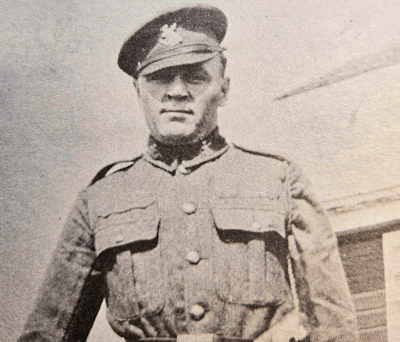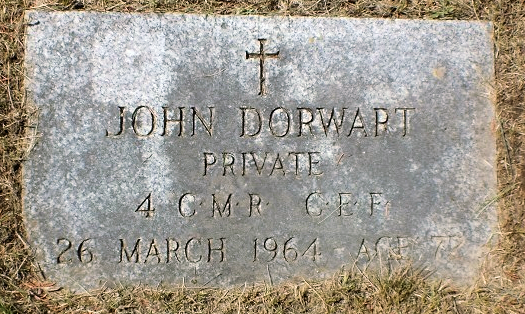
105002 Pte. Johan "John" Dorwart was born on 15th August 1891. His service file states repeatedly that he was Russian born, whilst genealogy sources state variously German, Moldovan or Romanian (with German parents), whilst his son's biography of him (below) states Austrian.
Regardless, when John answered the call, he was a single, 24 year old farmer when he signed on in Regina, Saskatchewan, on 20th October 1915. He was assigned to "A" Company of the 68th (Regina) Battalion, and after extended training sailed from Halifax NS on 1st May 1916, arriving in Liverpool, England on the 7th, aboard SS Olympic, sister ship to the infamous Titanic.
However, upon arrival into Shorncliffe, Kent, on England's south coast, John was hospitalised on 8th May, for ten days, suffering with bronchitis.
Given his disconnection from the 68th BN as a result, upon recovery John was subsequently transferred, along with 9 fellow 68th men, to the Ontario formed 4th Canadian Mounted Rifles in July 1916, this to help rebuild the regiment's huge losses in early June, at the 'Battle for Mount Sorrel'. He joined them in the field in France on 16th July 1916. This was the day the regiment was brought out of the front line for rest at Albert, France, after the costly attacks on Courcelette, which saw the first ever major use of tanks in battle.

John served with the 4th CMR without incident and was awarded permission to wear one Good Conduct Stripe on 20th October, 1917. After a further period of illness related hospitalisation in November 1917, John was transferred for administrative reasons (standard procedure when a soldier was hospitalised from an active unit) to the 2nd Central Ontario Reinforcement Depot (2nd C.O.R.D.). He was then transferred to the 1st C.O.R.D. on 15th February 1918, and the 3rd Reserve Battalion on the 18th. He remained with the 3rd Res. BN until August 1918, whereupon he returned to the 4th CMR in France, joining them in the field on 31st August 1918, where the regiment was engaged in the increasingly intense battles in the Cambrai area.
Johan "John" Dorwart served to war's end without further incident. Marrying in 1922, he and Katherine had six children, and John passed away in Saskatchewa in 1964, aged 72.
That concludes John's service history with the regiment.
4cmr.com now hands over to Walter Dorwart, John's son, to tell the family's story, as written by him and published in the Indian Head local history book of 1984.
My father, John Dorwart, was born in Austria in 1891 in a family of 5 boys and 4 girls. The 4 older boys came to Canada first and settled near Oakshella [Oakshela], with friends. In 1907 John came to Canada with his father, mother and 3 sisters, when he was 16 years old. They also settled at Oakshella, where his parents worked as hired help on farms. The boys worked at any job. John was naturalized in 1912. In 1915 he enlisted with the 68th battalion and served overseas with the 4th CMR and was wounded in action. After the war, he came to Indian Head and worked on the JB Francis farm (presently, Dale Bugless') and the John Cargo farm.
In 1922, he married Katherine Mohr (born 1902) of Lemberg, Sask. They worked as a hired couple for farmers at Oakshella, where 3 children were born, Johnny, August and Evelyn. August died at the age of 6 months with pneumonia in 1926. The family moved to Indian Head and worked on the Norman Ross farm in Squirrel Hills district, presently (Jack Wilkinson's). Here, tragedy struck when the only daughter, Evelyn, choked on a large penny and died at 2 years of age. 3 more sons were born, Walter, Ernie and Ron. Johnny, Walter and Ernie attended Squirrel Hills school.
In 1935, they moved into the town of Indian Head and John helped to dig by hand the waterline to the experimental farm. He also helped build the old 56 highway. In the early forties, he became herdsman at the experimental farm under superintendent Bill Gibson and worked until 1944 when he had to quit on account of ill health.
John Dorwart was a well-liked, happy-go-lucky man with a wonderful sense of humor. He liked to dance and play cards. He died in 1964 at the age of 72. Kate, his wife, was a member of the Legion Ladies Auxiliary and a faithful member of the Lutheran Ladies' Aid. She also liked to dance, play cards and cooked big meals. She died in 1970 at sixty seven.
Biography credits: Walter Dorwart, The Indian Head Museum, Saskatchewan, and genealogy sources.
Service history courtesy of 4cmr.com